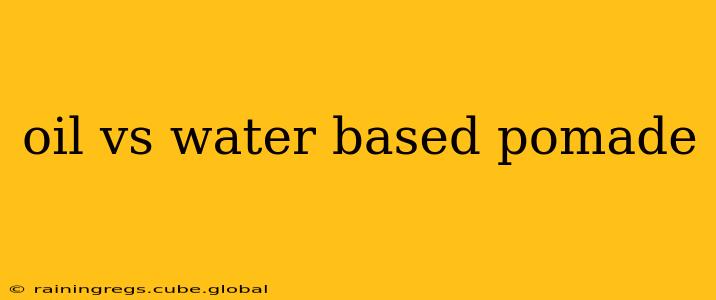Choosing the right pomade can significantly impact your hairstyle's look, feel, and hold. Two dominant types exist: oil-based and water-based pomades. Understanding their key differences is crucial for making an informed decision. This comprehensive guide will explore the pros and cons of each, helping you select the perfect pomade for your hair type and styling needs.
What is Oil-Based Pomade?
Oil-based pomades are traditionally formulated with petroleum, mineral oil, or other oil-based ingredients. This gives them a distinct, heavier feel and a high shine. They provide excellent hold and are known for their ability to keep hairstyles in place throughout the day, even in challenging weather conditions.
Pros of Oil-Based Pomade:
- Strong Hold: Oil-based pomades offer superior hold, ideal for slick-back styles, pompadours, and other structured looks.
- High Shine: They deliver a noticeable, glossy shine, adding a classic, sophisticated touch to your hairstyle.
- Long-Lasting Hold: Their lasting power is unparalleled, keeping your hair in place for extended periods.
- Builds Up: The build-up from repeated use can actually enhance hold over time for some users, creating a more sculpted look.
Cons of Oil-Based Pomade:
- Difficult to Wash Out: This is their biggest drawback. They require multiple washes with a strong shampoo to completely remove, and residue can sometimes build up.
- Can Feel Heavy: The heavy, greasy feel might not suit all hair types or preferences.
- Can Be Messy: Oil-based pomades can be messy to apply and can stain clothing.
- Not Ideal for Fine Hair: Their weight can weigh down fine or thin hair, making it look limp.
What is Water-Based Pomade?
Water-based pomades utilize water as their primary base, often incorporating ingredients like polymers, waxes, and emollients to achieve hold and shine. Generally, they offer a lighter feel and are easier to wash out compared to their oil-based counterparts.
Pros of Water-Based Pomade:
- Easy to Wash Out: Simply shampoo your hair once or twice to remove it completely.
- Lighter Feel: They provide a less greasy and more natural feel, suitable for various hair types.
- Versatile Hold: While generally offering a less firm hold than oil-based, many water-based pomades offer a range of holds, from light to medium or even firm.
- Less Residue Build-up: They are less prone to leaving residue buildup.
Cons of Water-Based Pomade:
- Less Hold: Generally, they provide less hold than oil-based pomades, particularly in humid conditions.
- Less Shine: The shine is typically less pronounced than with oil-based pomades.
- Can Dry Out Hair: Some formulations might contain ingredients that can dry out the hair if used excessively.
- May Require Reapplication: Depending on the formulation, you might need to reapply throughout the day to maintain the style.
Which Pomade is Right for Me?
The best pomade for you depends on several factors:
- Hair Type: Fine hair may benefit from a light water-based pomade, while thicker hair can handle the stronger hold of an oil-based pomade.
- Desired Hold: If you need a strong, all-day hold, oil-based is the way to go. For moderate hold and flexibility, water-based is often sufficient.
- Shine Preference: Oil-based pomades offer a high-shine finish, while water-based pomades provide a more natural or subtle shine.
- Washing Preferences: If you prioritize easy washing, water-based is the better choice.
How Do I Apply Pomade?
Regardless of the type, applying pomade correctly is key. Start with small amounts, working it through your damp or dry hair (depending on the pomade's instructions) and style as desired.
What are the differences in the ingredients of oil-based and water-based pomades?
Oil-based pomades primarily utilize petroleum-based oils, waxes, and sometimes fragrances. Water-based pomades, as their name suggests, use water as a base and typically include polymers, resins, and emollients to provide hold and conditioning. The ingredients heavily influence the feel, hold, and wash-out properties.
Can I use oil-based and water-based pomades together?
While not recommended for daily use, you might experiment with layering them for a unique hold and shine. Generally, it's best to apply the water-based pomade first, followed by the oil-based one for a strong, controlled style. However, be aware that this could lead to increased residue and difficulty washing out.
Are there any specific hairstyles better suited to one type of pomade over the other?
Slicked-back styles and pompadours often benefit from the strong hold of oil-based pomades. Water-based pomades work well for less structured styles, textured looks, and styles requiring more flexibility.
By considering these factors and understanding the distinct characteristics of oil-based and water-based pomades, you can confidently choose the perfect product to achieve your desired hairstyle and enjoy the process. Remember to always read product instructions for specific application and styling advice.
